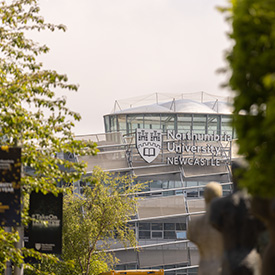-
Study
-
Undergraduate
- Search for a Course
- Undergraduate Open Day & Events
- Application Guides
- Northumbria University UCAS Exhibitions
- Foundation Years
- Undergraduate Fees & Funding
- School & College Outreach
- Continuing Professional Development
-
Postgraduate
- Postgraduate Study Degree
- Postgraduate Research Degrees
- Postgraduate Open Days and Events
- Postgraduate Fees & Funding
- Flexible Learning
- Thinking about a Masters?
- Continuing Professional Development
- Change Direction
-
Student Life
- The Hub - Student Blog
- Accommodation
- Life in Newcastle
- Support for Students
- Careers
- Information for Parents
- Students' Union
- Northumbria Sport
- Be Part of It
-
-
International
International
Northumbria’s global footprint touches every continent across the world, through our global partnerships across 17 institutions in 10 countries, to our 277,000 strong alumni community and 150 recruitment partners – we prepare our students for the challenges of tomorrow. Discover more about how to join Northumbria’s global family or our partnerships.
View our Global Footprint-
Applying to Northumbria
- European Union
- Our London Campus
- Northumbria Pathway
- International Events
- Entry Requirements and Country Representatives
- Global Offices
-
Northumbria Language Centre
- Faculty Requirements
- Acceptable English Requirements
- Pre-sessional English Language and Study Skills
- Academic Language Skills Programmes (ALS)
-
International Fees, Funding & Scholarships
- International Undergraduate Fees
- International Undergraduate Funding
- International Masters Fees
- International Masters Funding
- International Postgraduate Research Fees
- International Postgraduate Research Funding
- International Money Matters
-
Life at Northumbria
- International student support
- Careers
-
International Mobility
- Current Northumbria Students
- Incoming Exchange Students
-
-
Business
Business
The world is changing faster than ever before. The future is there to be won by organisations who find ways to turn today's possibilities into tomorrows competitive edge. In a connected world, collaboration can be the key to success.
More on our Business Services -
Research
Research
Northumbria is a research-rich, business-focused, professional university with a global reputation for academic quality. We conduct ground-breaking research that is responsive to the science & technology, health & well being, economic and social and arts & cultural needs for the communities
Discover more about our Research -
About Us
-
About Northumbria
- Our Strategy
- Our Staff
- Place and Partnerships
- Student Profiles
- Alumni Profiles
- Leadership & Governance
- Academic Departments
- University Services
- History of Northumbria
- Contact us
- Online Shop
-
-
Alumni
Alumni
Northumbria University is renowned for the calibre of its business-ready graduates. Our alumni network has over 246,000 graduates based in 178 countries worldwide in a range of sectors, our alumni are making a real impact on the world.
Our Alumni - Work For Us
What will I learn on this module?
This module will develop your knowledge of the theories, models and concepts which underpin the provision of midwifery care. This is a year long module aligned to Midwifery Practice 2, reflecting the close connections between theory and practice.
Building on your learning from year one, you will develop and critique further knowledge around the physical, psychological and social care needs that may arise throughout the childbirth continuum. This will include evaluation of assessment and screening approaches and a critical review of midwifery practice in terms of optimising outcomes for women and infants. You will consolidate your knowledge of physiological processes in relation to the woman and fetus, and apply and analyse the implications of pathophysiology and additional care needs in the context of midwifery practice. The interdisciplinary roles of professionals and care pathways involved when additional care needs arise will be explored, with emphasis on the midwife’s role, to facilitate your development as a practitioner.
The module will analyse relevant epidemiological data and national reports, such as Mothers and Babies: Reducing Risk through Audits and Confidential Enquiries across the UK (MBRRACE), to identify significant additional care needs that may affect women, newborn infants and their families, and the subsequent implications for the midwife's role. Examples of these additional needs include:
• Pre-existing long term conditions, both physical and psychological, and their impact on pregnancy and birth
• Conditions arising during pregnancy
• Infection: microbiology, immunology, pharmacology and pharmokenetics
• Complications of labour and birth; compromise and deterioration
• Postnatal ill health, complexity in infant feeding and family-infant relationships
You will further develop skills in holistic and physical assessment methods to enable the recognition of deterioration, referral, and escalation, along with the role of the midwife in continuity and co-ordination of care, including advocacy for women and newborn infants with additional needs. Recognition of the diverse needs of women, babies, partners and fathers will be at the heart of the module, with reference to fundamental aspects of care: compassion, respect and inclusivity.
How will I learn on this module?
You will learn through a combination of lectures, seminars, practical simulation, directed and independent study. Activities will be blended to create a mix of face to face and online activities supported by the University’s Electronic Learning Platform (eLP), Blackboard Ultra. Lectures will introduce key concepts in relation to pathophysiology, midwifery assessment, screening and care planning, public health and ill health creating additional needs for women and babies. Again, the service user experience in relation to additional care needs will be integral to the module, for example through women talking about their experience of long-term health conditions. Practice scenarios which illustrate women’s journeys and use women’s stories will aid in the application of theory. Concepts will then be further explored within seminars which will facilitate collaborative learning, develop your inquiry and communication skills and signpost you further reading and learning activities. Clinical skills sessions will facilitate skill development and refection, peer support and feedback through experiential approaches to learning. A range of resources will be used to continue to develop your evidence searching and retrieval skills, including technology enhanced learning. You will have ongoing access to the University library and the digital resources to support your academic development, as well as access to simulation equipment to enhance your learning.
How will I be supported academically on this module?
The academic staff involved in delivering this module will provide support and academic guidance to ensure that you are able to confidently engage with the module content. Learning materials, including directed and e-learning will be made available on the eLP. Seminars and clinical simulation sessions will form an opportunity for lecturer and peer support and feedback throughout the module. Formative feedback will be available to enable you to review your learning in a safe and supportive environment, and group tutorials will further support preparation for the module assessments. In addition, the module will be supported by University library staff and resources, including study skills support packages.
What will I be expected to read on this module?
All modules at Northumbria include a range of reading materials that students are expected to engage with. Online reading lists (provided after enrolment) give you access to your reading material for your modules. The Library works in partnership with your module tutors to ensure you have access to the material that you need.
What will I be expected to achieve?
You will be expected to:
Knowledge & Understanding:
1. Demonstrate a critical understanding of the additional physical needs of women and neonates throughout the childbirth continuum, and relevant underpinning pathophysiology.
2. Demonstrate a critical understanding of the additional psychological and social care needs of women and neonates throughout the childbirth continuum, and relevant underpinning pathophysiology.
3. Demonstrate understanding of the application of therapeutic and pharmacological interventions in relation to women and neonates with additional needs.
Intellectual / Professional skills & abilities:
4. Critically appraise the role of the midwife in co-ordinating and evaluating care for women and infants with additional needs, and their part in inter-disciplinary collaboration.
5. Prioritise assessment and management associated with compromise and deterioration in woman, fetus and infant.
6. Critically analyse the evidence base for care in complex and challenging circumstances.
Personal Values Attributes (Global / Cultural awareness, Ethics, Curiosity) (PVA):
7. Demonstrate a critical awareness of the knowledge and skills required to provide respectful and effective care to all women and their families.
How will I be assessed?
Formative assessment:
Ongoing feedback will be available from tutors throughout the module following directed activities such as seminars and following completion of e-learning activities. Workbooks and sample questions will be used to facilitate formative learning.
Summative assessment:
1. 3000 word case study (50%)
relating to the care of a woman and neonate dyad with additional needs, with analysis of the underpinning evidence and reference to the role of the midwife in the coordination of care and the UNICEF BFI standards.
(MLO 1, 2, 4, 5, 6, 7).
2. Pathophysiology exam (50%)
90 minute pathophysiology and pharmacology exam (short and long answers) covering physical and psychological conditions affecting the woman, fetus and infant.
(MLO 1, 2, 3, 5).
Written feedback will be provided via Turnitin.
Pre-requisite(s)
N/A
Co-requisite(s)
N/A
Module abstract
This module further develops your knowledge and understanding of the universal and additional care needs of women, neonates and families throughout the childbirth continuum. The module will explore a variety of additional needs and their application to the role of the midwife in assessment and care, developing confidence and competence around effective collaborative working and inter-disciplinary practice. You will be supported to critically analyse the evidence base for practice around additional care needs and to apply this clinically and theoretically in order to deliver safe effective practice to all women.
Course info
Credits 40
Level of Study Postgraduate
Mode of Study 3 years Full Time
Department Nursing, Midwifery & Health
Location Coach Lane Campus, Northumbria University
City Newcastle
Start January 2025
All information is accurate at the time of sharing.
Full time Courses are primarily delivered via on-campus face to face learning but could include elements of online learning. Most courses run as planned and as promoted on our website and via our marketing materials, but if there are any substantial changes (as determined by the Competition and Markets Authority) to a course or there is the potential that course may be withdrawn, we will notify all affected applicants as soon as possible with advice and guidance regarding their options. It is also important to be aware that optional modules listed on course pages may be subject to change depending on uptake numbers each year.
Contact time is subject to increase or decrease in line with possible restrictions imposed by the government or the University in the interest of maintaining the health and safety and wellbeing of students, staff, and visitors if this is deemed necessary in future.
Useful Links
Find out about our distinctive approach at
www.northumbria.ac.uk/exp
Admissions Terms and Conditions
northumbria.ac.uk/terms
Fees and Funding
northumbria.ac.uk/fees
Admissions Policy
northumbria.ac.uk/adpolicy
Admissions Complaints Policy
northumbria.ac.uk/complaints













